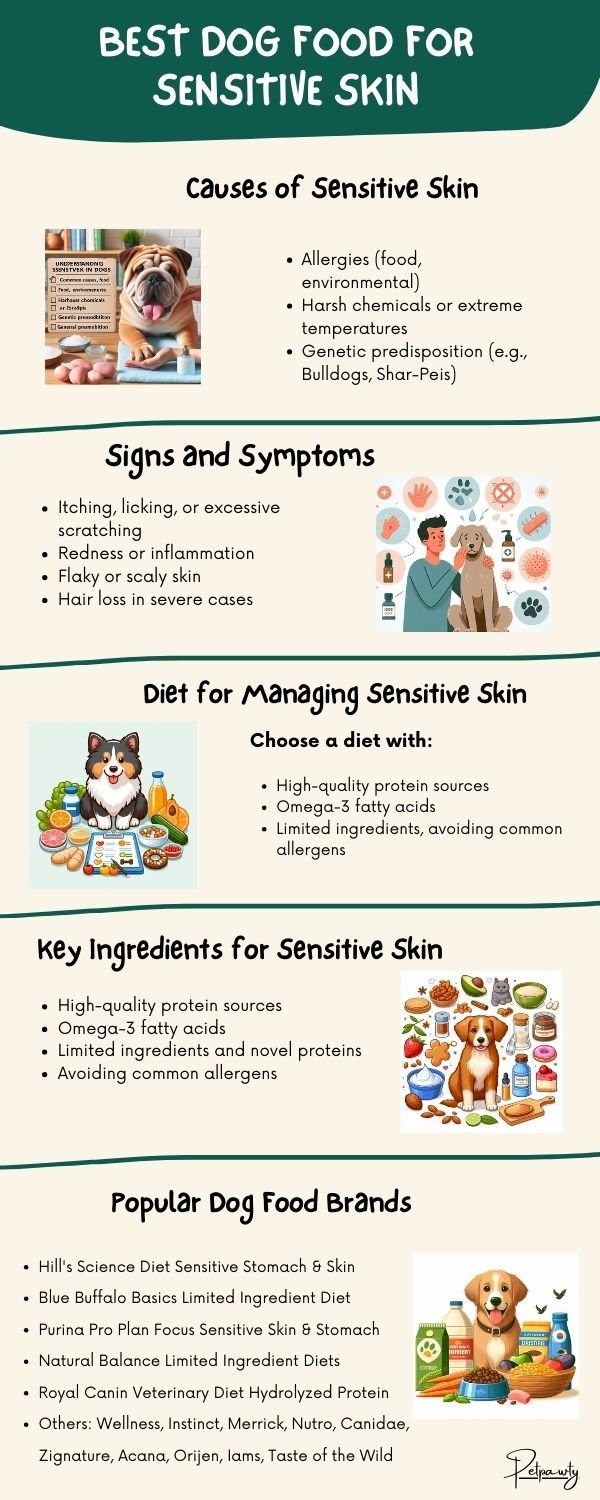Choosing the Best Dog Food for Sensitive Skin in 2024 : Tips from a Veterinarian
Welcome to our article on choosing the best dog food for sensitive skin! Just like humans, dogs can suffer from sensitive skin, which can lead to discomfort and itching In this article, we will be looking at the causes and symptoms of sensitive skin in dogs, ingredients that are known to be good for dogs with sensitive skin, and some of the brands that you can go to if you have sensitive skin. Whether you're a new dog owner or an experienced pet parent, don't pass this guide up. Let's get started!

What is the Best Dog Food for Sensitive Skin?
The best dog food for sensitive skin can vary depending on your dog’s specific needs and sensitivities. It’s essential to consult with your veterinarian to determine the best diet for your dog’s individual needs. They can help you identify any underlying health issues or allergies contributing to your dog’s sensitive skin and recommend the most suitable diet.
Understanding Sensitive Skin in Dogs
Common causes of sensitive skin in dogs
Sensitive skin in dogs can be caused by a variety of factors. Some common causes include:
- Allergies: Dogs can be allergic to a variety of things from different foods, such as environmental allergens like pollen or dust, and flea bites. All these allergies make the skin feel itchy.
- Environmental factors: If your dog gets exposed to harsh chemicals that can be found in many pet cosmetics or household cleaners, then their skin can be irritated. In a similar way dry air may cause skin sensitivity, the same as extreme temperatures can.
- Genetics: Some breeds have a natural tendency for more skin sensitivities than others. Shorter-haired or droopy-coupled dogs, such as Bulldogs or Shar-Peis, are likely to have more skin problems.

Signs and symptoms of sensitive skin
The dogs with sensitive skin will be evidenced by various symptoms and signs. Some common ones include:
- Itching: Dogs with damaged air passage may sneeze, touch, or lick themselves excessively, usually on the ears, the paws, or the belly.
- Redness or inflammation: Skin prone to this problem becomes red and inflamed, and that can be particularly difficult on the areas where the skin is thin but well exposed, like the ears or nose.
- Flaky or scaly skin: Aggressive skin can become so dry and flaky, which leads to dandruff or scaly patches.
- Hair loss: In the most severe cases dogs with sensitive skin may experience hair loss or bald patches.
The role of diet in managing sensitive skin
Through a nutritional approach, our pet care becomes more effective by helping to manage sensitive skin in dogs. Specific ingredients may worsen skin sensitivity, whilst others could moisturize and nourish the skin. If choosing food for a dog with an allergic skin, then you need to seek a product that contains a highly digestible protein source, omega-3 fatty acids and low amounts of ingredients. Using alternatives, in particular grains and artificial extras, is an excellent way to reduce the risk of causing skin sensitivity.
Key Ingredients for Sensitive Skin in Dogs

High-quality protein sources
Look for dog foods with specific meats like chicken, turkey, or salmon listed first. Avoid vague terms like "meat meal" or "animal by-products."
Omega-3 fatty acids
These support healthy skin and coat. Look for added omega-3s or consider supplements like fish oil.
High-quality protein sources
Look for dog foods with specific meats like chicken, turkey, or salmon listed first. Avoid vague terms like "meat meal" or "animal by-products."
High-quality protein sources
Grains, soy, and artificial additives can trigger skin sensitivities. Choose foods free from artificial colors, flavors, and preservatives, and consider grain-free options.
Choosing a dog food with these ingredients can support your dog's sensitive skin and overall skin health. Transition to new food gradually and provide fresh water.
Popular Dog Food Brands for Sensitive Skin

Hill's Science Diet Sensitive Stomach & Skin
Hill's Science Diet offers a formula specially designed for dogs with sensitive stomachs and skin. It features easily digestible ingredients and omega-6 fatty acids for a healthy coat.
Blue Buffalo Basics Limited Ingredient Diet
Blue Buffalo Basics is known for its limited ingredient diet. It contains a single source of animal protein and is free from common allergens like corn, wheat, soy, and dairy.
Purina Pro Plan Focus Sensitive Skin & Stomach
Purina Pro Plan Focus is formulated with salmon as the primary protein source and is free from common allergens. It also contains omega-6 fatty acids and zinc for healthy skin and coat.
Natural Balance Limited Ingredient Diets
Natural Balance offers a range of limited ingredient diets featuring a single source of animal protein and limited carbohydrates. They are free from artificial flavors, colors, and preservatives.
Royal Canin Veterinary Diet Hydrolyzed Protein
Royal Canin Veterinary Diet Hydrolyzed Protein is designed for dogs with food sensitivities. It features hydrolyzed proteins, which are broken down into smaller components to reduce the risk of allergic reactions.
Here are some additional popular dog food brands that offer options for dogs with sensitive skin:
- Wellness Simple Limited Ingredient Diet
- Instinct Limited Ingredient Diet
- Merrick Limited Ingredient Diet
- Nutro Limited Ingredient Diet
- Canidae Pure Limited Ingredient Diet
- Zignature Limited Ingredient Diet
- Acana Singles Limited Ingredient Diet
- Orijen Limited Ingredient Diet
- Iams Sensitive Naturals
- Taste of the Wild Limited Ingredient Diet
These brands offer a variety of formulas that cater to dogs with sensitive skin, including limited ingredient diets, grain-free options, and formulas with added omega-3 fatty acids.
Tips for transitioning your dog to a new food
Gradual transition process
When switching your dog to a different food, remember to do it gradually in order to prevent stomach upset. Start off by mixing a small amount of the new food with the one they are already eating and gradually increase the amount over a period of about a week or two. This smooth shift makes it easy for the dog's digestive system to adapt to the new food which minimizes the risk of an upset stomach.
Observe your dog's response to the new diet.
When your pet changes their diet, monitor their reaction carefully. If you experience digestive problems, such as vomiting, diarrhea, or excessive gas, look for these signs. In addition, keep an eye on their skin and coat for any changes e.g. itching, redness or flakiness. If you observe any signs of negative reaction during the transition period, temporarily stop the transition process and consult with your veterinarian.
Consulting with a veterinarian if necessary
In case you are not clear about how to change your dog’s food gradually or you have any concerns regarding your dog's reaction to the new food, it will be better to consult with your vet. Your vet can give you personalized recommendations that are based on your dog's individual needs and past/current health history. On top of that, they can be used to determine whether your dog has any particular allergies or sensitivities which may be responsible for skin or gastrointestinal problems.
Conclusion
Finding the best dog food for sensitive skin may sound like a difficult task, but with the appropriate information, you can make a decision that you will be proud of. Knowing causes and symptoms of sensitive skin, what ingredients to look for, and famous brands on the market will help you. Bear in mind since every dog is unique, it may take some experimenting to find the right kind of food. Give it time and do not quit, you will find the right diet for your dog's sensitive skin.
FAQ'S
How can I determine if my dog's skin is sensitive?
What are the common causes of sensitive skin in dogs?
What ingredients should I look for in dog food for sensitive skin?
Are there any ingredients I should avoid in dog food for sensitive skin?
How do I transition my dog to a new food without causing digestive upset?
Should I consult with my veterinarian before switching my dog to a new food?
Resource's
PetMD: Offers veterinarian-reviewed articles and insights on pet care, including food choices for pups with allergies or sensitivities.
American Veterinary Medical Association (AVMA): Search their resources for articles and guidelines on managing skin conditions in dogs, including dietary recommendations.
DogFoodAdvisor: Provides in-depth analyses of dog food formulas, ingredient lists, and recalls. Look for their sections on food for allergies and skin issues.
All About Dog Food: (https://allaboutdogfood.co.uk/) Offers independent reviews, ingredient comparisons, and a helpful search tool to find formulas suitable for sensitive dogs.
Hill’s Science Diet: (https://www.hillspet.com/) Known for their prescription and specialized diets, including options for food sensitivities and skin health.
Purina Pro Plan: (https://www.purina.com/pro-plan) Offers a range of formulas, including ones focused on sensitive skin and stomach issues.
Royal Canin: (https://www.royalcanin.com/us) They have a veterinary line of foods with options catering to skin sensitivities.







